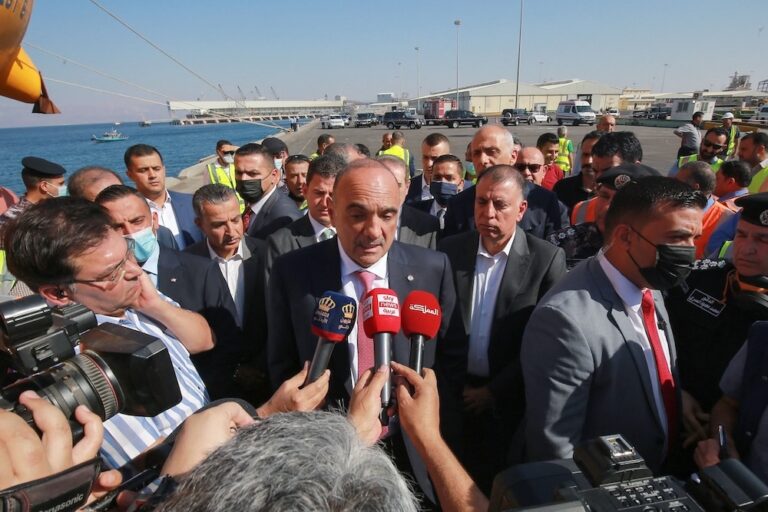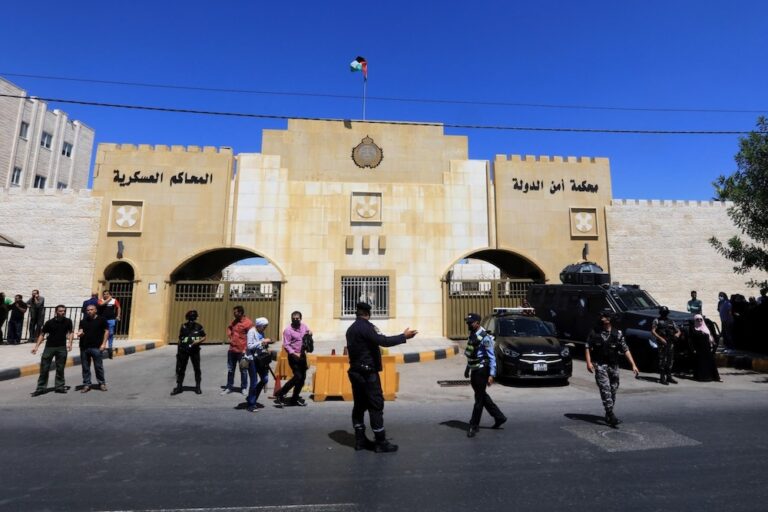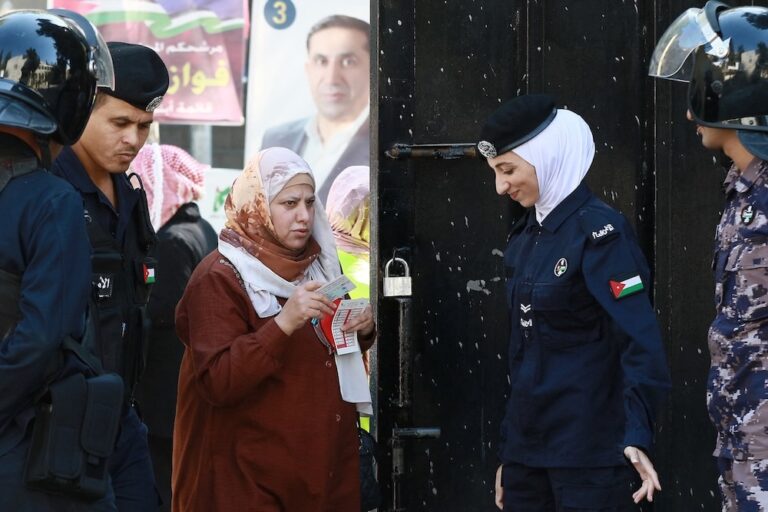(AAI/IFEX) – The following is an AAI capsule report: Report on Media in Jordan for 2005 2005 was a year of distress for the private press in Jordan. The government and the Jordan Press Association launched attacks on the private weeklies, accusing them of harming the country’s image. 1. First, at the level of mandatory […]
(AAI/IFEX) – The following is an AAI capsule report:
Report on Media in Jordan for 2005
2005 was a year of distress for the private press in Jordan. The government and the Jordan Press Association launched attacks on the private weeklies, accusing them of harming the country’s image.
1. First, at the level of mandatory membership:
In August 2005, the attacks against supporters of canceling mandatory membership in the pro-government Jordan Press Association (JPA) escalated, following the recommendation of the National Agenda Committee to cancel the related provision in the JPA law. The most prominent action in the JPA’s campaign to discredit its opponents was its publicly accusing them of seeking foreign funding and of having suspicious motives.
During September and October 2005, media propaganda filled the pages of pro-government newspapers and papers favourable to the government with articles critical of the National Agenda recommendation. In response, the JPA called on journalists to strike for one hour and invited its members to a sit-in in front of the Prime Minister’s office in October to protest the potential cancellation of the mandatory membership.
Although membership in the JPA is mandatory for practicing journalism, there are a number of journalists (estimated at 150 in one report) who practice without such membership. This may be attributed to their conviction of JPA’s uselessness, or because they do not fulfill membership conditions, or simply because they reject the concept of mandatory membership.
There are many flaws in the JPA Law that make it difficult to secure membership. There is the requirement of a university degree, a training requirement, the requisite of working fulltime in a newspaper, and a prohibition from working in any other field or location. Correspondents for foreign newspapers, news agencies and satellite channels are not eligible. As well, only journalists of Jordanian nationality may become members, thus excluding Palestinian, Lebanese, and Iraqi nationals, and even Jordanians of Palestinian origin who hold temporary passports.
These exclusionary requirements partly explain why a significant number of journalists work outside the JPA umbrella, while many non-journalists are members.
The JPA’s campaigns were waged following the king’s speech on 16 August 2005, in which he criticized the role of the private weeklies in disseminating rumours and lies at the expense of the national interest.
In August 2005, the JPA unveiled its plan to amend a provision in the Press and Publications Law that allows individuals [who are not accredited journalists] the right to publish – the only right still enjoyed by Jordanians following a series of restrictions on freedom rights and judicial crackdowns on press freedoms. In the JPA’s opinion, it is due to this provision that there are many “infiltrators” in the profession.
2. Depriving the private press of government advertising and subscription revenues
During the wave of attacks on independent journalists and private weeklies, the government took another unprecedented decision that officially deprived the private press from open access to government advertising revenues and subscriptions. Then-Prime Minister Adnan Badran announced that government advertising contracts and subscriptions to private newspapers must be authorized through him personally.
Weeklies were surprised at this measure. A number of owners and publishers requested an audience with the Prime Minister to discuss the decision. The JPA council did not consider this case a priority and did not refer to the matter during the meeting it held with the Prime Minister during the same week the decision was issued. According to a JPA council member, the issue was not brought up because of the “tight schedule” within which they were working and because the agenda for the session already contained “a large number of issues”.
Although the decision did not affect those newspapers that did not receive advertising contracts or subscriptions from the government, it caused others to lose significant revenues, as much as JD 40,000 (approx. US$56,000) in some instances. One such newspaper is the weekly “Al Mihwar”, for which the loss may lead to bankruptcy and therefore its closing.
During the month of August 2005, the JPA ignored the resulting plight of the weeklies and instead promised more escalations on its campaign against what it calls “infiltrators on the journalism profession.”
3. Attacks
Hadi Abdul Latif Nsour, 30, a journalist working for the daily newspaper “Al Ghad”, was detained on 14 March 2005 for questioning by authorities about his allegedly publishing “false and fabricated news” in a report he filed on the death of Jordanian citizen Raed Banna, who was killed in a deadly suicide attack that killed 118 people in Hilla in the south of Baghdad in February 2005.
“Al Ghad” editor-in-chief Emad Hmoud said that the paper’s local news chief editor, Basel Rafaya’a, 35, was also summoned by the mayor of Amman and was referred to the attorney general in West Amman, regarding the same story. Both journalists were under investigation by the prosecutor-general.
Nsour’s story alleged that Banna’s family was celebrating the Hilla attack and receiving congratulations instead of condolences. The paper ran a correction the next day, saying it condemned attacks on innocent civilians, and quoting Banna’s family as saying that the family was receiving condolences and not congratulations over the death of their son.
4. Harassment
Authorities delayed publication of the weekly “Al-Wihda” on 10 April 2005, until an article by columnist Muwafaq Mahadin was removed. On May 8, the edition of another weekly – “Al-Majd” – was delayed until an article was removed. The article related to an interview the weekly carried out with a parliamentarian who said he supported the Iraqi insurgency.
Security services investigated a complaint by the daily newspaper “Al Anbat” that it had been attacked on 28 September 2005. “Al Anbat” spokespeople said that the paper was attacked by three masked assailants. Reports said that the assailants broke into the newspaper’s information office and handcuffed and assaulted the night guard.


